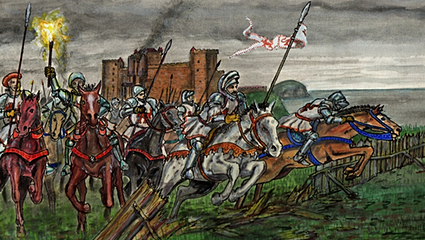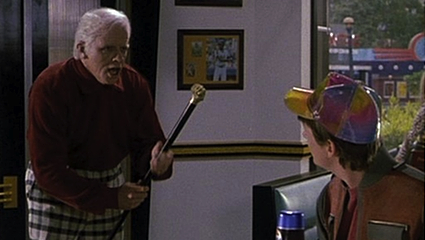Editorials
The many challenges of being a games journo
August 16, 2012, Author: Jesper Hauerslev
Look up ‘review’ in the dictionary and it will be defined as an informed and impartial evaluation of a service or a product, or something very much along those lines. At its core, a review is a service aimed at the consumer to help them make an informed decision over whether or not to make a purchase. A positive review can therefore be a powerful weapon as it can directly or indirectly affect a company’s bottom line.
As the wise man said: “with great power comes great responsibility”, and with gaming being a multi-million dollar industry now, the field of games journalism has become a battleground. Is it a battle that us game journos are ready for, or even prepared to fight?
A few weeks ago, game journalists from across the nation gathered at BAFTA in London to discuss just that. Not to mention game journalism in general, where it’s been, where it’s going and the challenges it faces along the way.
The panel was hosted by The Guardian’s Videogame Correspondent, Keith Stuart, and featured the journalist, writer and creator of ‘Zombies, Run!’ Naomi Alderman; games blogger for New Statesman Helen Lewis; founder of Gamesindustry.biz and veteran games journalist Rob Fahey; IGN UK Games Editor Keza MacDonald; and founder of Rock Paper Shotgun Kieron Gillen.
Attack on Castle Mainstream
Keith Stuart fired the opening shot of the discussion by asking the panel what they would like to see more of in the future. Naomi Alderman was quick to point out that she would like to see games finally getting pushed into the mainstream media culture, which the other panelists argued had already happened.
While still being treated as the new kid on the block that no one really knows how to play with yet, gaming has broken through a previously thought to be impenetrable wall. It gets coverage in mainstream news like BBC, Channel 4 and The Guardian; although is often accompanied by head scratching from the wider public.
That’s okay, though. At least we are there now, and just like news about sports and politics have their own experts commenting about these issues, so does gaming, like the panel’s very own Keith Stuart and Rob Fahey. So if breaking through the gates of Castle Mainstream is no longer the challenge, then what is?

"This castle is ours! On to the next challenge, men!"
A mature discussion
Well, take your pick! “Game journalism has developed a great deal in the last ten years and the relationship between the media and the games industry has improved,” says Kieron Gillen of Rock Paper Shotgun. “This also means there are now many things to pick about game journalism but that’s a good thing.” Gaming is now more a part of mainstream media coverage than it was before, just as it has become accessible to more people than before.
Oddly enough, this sometime creates a backlash from the gamers themselves. “Look at the Nintendo Wii. That went mainstream and now gamers dislike it”, says Keza MacDonald of IGN UK. She explains: “We like being part of a ‘geeky fan base.” New Statesman’s Helen Lewis was also quick to point out that “there is still a lot of work to do to get them to take us serious and shake the image of the stereotypical gamer”.
Part of that is finding a better way to talk about games. “I would like to see a more academic tone” says games journalist Rob Fahey. “Hopefully one that is loud enough for everybody to hear.” This new tone could come from the universities. Gaming is already a fully legitimate academic field. Several universities offer courses on how to make games, but what about courses on how to understand games or simply how to analyse them?
Movies, literature and music have been part of academic studies for a long time now and as a result, the conversations around cinema, for example, can easily shift from how well a story is told to what a character’s actions say about the human condition as a whole, without it seeming pretentious. Gaming, sadly, is not there yet, but then it is still finding its own way and its own language in academia.
Previously it was shoehorned, sometime forcefully, into theories originally intended for cinema and literature, but a game is nothing like either. This is changing now. Students who love games are now coming out the other end of the “brain-factories” with new degrees, and most importantly new theories on gaming that they pass on to new students, and so the academic side of gaming continues to evolve.
This then spills over into the mainstream to benefit us all, as the new ideas, the new theories and the new ways of looking at gaming results in features, blogs and reviews that go beyond what we simply see and play on screen, but also what that makes us feel and how that makes us think.
A symbiotic relationship
A new tone in game journalism is but one challenge, however. “Games journalism is built around an industry that wants to drive sales to the customer and there is no point denying that,” said Rob Fahey, “A positive review can be a powerful weapon and the industry knows this.” In fact, they might even be too aware of it. Gaming turns over millions and millions of pounds and everybody is looking for the next Modern Warfare-style mega hit, so when a publisher think they’ve got it, the battle for the reviewers favour begins.
Enter the PR agencies and the strange symbiotic relationship that exists between them and game journalists. Game journalists need the PR companies to send them review codes and invite them to launch parties, while PR companies need the game journalists to promote their games in a generally positive way to drive sales and hopefully result in targets being made, and thus bonuses being paid. It’s an awkward position to be in but one you have to come to terms with.
“Game journalism relies on advertising,” says Fahey. “Not as much as beauty or fashion, but it’s still dependent. The trick is finding a balance that doesn’t compromise your integrity as a journalist but still retains trust.” A good PR person knows this and respects it. Others are just plain clueless. “My main annoyance with PR and marketing is when they don’t understand the internet and the pointlessness of regional exclusives,” says Keza MacDonald. “Your game is not an exclusive if I’ve already read about it online.”
Beaten with a stick
While this may be a lighter side to the often strained relationship between PR, marketing and game journalists, there is a darker, uglier and more twisted side as well when the advertising becomes the stick with which to beat a games journalist with. A few years ago, American game site GameSpot reviewed Kane & Lynch: Dead Men and gave it a less than great review. Sadly, publisher Eidos had just poured a load of advertising money into GameSpot so it didn’t look good that the game being so heavily advertised was only given a “Fair” rating.
Shortly thereafter the reviewer, Jeff Gerstman, left GameSpot and speculation ran wild that he was fired because of his negative review. CNET, the company that operates GameSpot, were adamant that this was not the case. However, earlier this year Jeff was finally in a position to reveal the truth about what happened. According to Gerstman, his departure was the result of long-standing tension between the editorial staff and a new marketing team that wasn’t familiar with video-game journalism or how to deal with annoyed publishers like Eidos. So, when Eidos threatened to pull all their advertising money, CNET panicked and fired Gerstman in an effort to appease the angry publisher.

"Hey butthead! You gave my game a 6.3/4 with a thumb half way up!"
This brings us onto the reviews themselves, the bread and butter of any games publication, and in particular the scoring. How do you score a game and how do you give a score that adequately conveys the overall success or failure of game? Scale from 1 to 10? How do you then differentiate between a 9 and a 10? Does a score of 5 and below mean it’s just not worth it? Why then give a game a score of 3? A simple thumbs up or thumbs down then?
What about games that might not be your fancy but might appeal to others? What is the middle ground? Is there even one? Do you either like or loathe a game or just like them all but to different degrees? Do you even need a score at all? That approach certainly seemed to have worked for Kieron Gillen’s Rock Paper Shotgun who writes “Wot I Think”, which doesn’t even have a scoring system.
That is not to say that we should just get rid of scores altogether, because they do serve a purpose. They are a quick way to get an overview of whether a game is good or not and yes, they do help the gamer decide whether to buy the game or not. I will happily admit that I have bought games purely based on what the score was without even reading the review.
A score, regardless of how high or how low, is indeed a powerful thing and that is where aggregators like Metacritic gets put in a funny position. Metacritic collects scores for movies, games, tv and music from several review sites and magazines, and then collates all the scores into one “Metascore”. It’s a nice and simple idea. “There is nothing wrong with the Metacritic concept”, says Keza MacDonald. “The problem is the way Metacritic is used, like not paying bonuses to developers who don’t hit a certain Metascore.”
“85”
The bonus-less developers in question are Obsidian, who missed out on bonuses when their much-anticipated Fallout: New Vegas, which was generally well received, “only” scored 84 on Metacritic. Apparently, the demand had been a score of 85 and above, but since they missed their goal, no bonuses were paid. “The gaming industry is the only industry doing this and it’s a problem, because it turns the review into something it was never supposed to be and gives sites as Metacritic a power they should never have,” says Keza.
Where reviews should be informative, they have now become oppressive and it doesn’t stop there. A few weeks ago Irrational Games posted a job listing on the Gama Sutra Job Board for a design manager who, in addition to the experience one would normally expect from a design manager, also needed to have worked on at least one title with an average Metascore of 85.
The job posting seems to have been amended since then and any references to a Metacritic score has since been removed. Was this simply an over-zealous HR Manager getting a bit too excited, or is this the start of a genuine industry-wide trend? If so, this is cause for some concern for anybody who posts any thoughts on any game anywhere. As a games journalist it puts me in a awkward and highly uncomfortable position where my perception of a game is disproportionately linked with the amount of effort the person put into the game.
A game could have been delivered on time and on budget and been technically flawless, but just not fun to play or appealing to me the reviewer. The reasons behind this can be highly ambiguous and completely out the hands of the poor programmer, producer or design manager who actually did his or her job perfectly. This will result in a low score which is, and should always be, a reflection of the whole and not on the performance of an individual, and certainly not to prevent an otherwise very talented individual from getting a new job or a bonus.

"Oh mighty reviewer! Grant me the magic of 85 so that I might feed my young ones!"
It also begs the question of where the idea of “85” as the ultimate score came from. Max Payne 3 is generally scored well above 85 but still failed to sell as well as expected, meaning it didn’t fare well with gamers. Indeed, if you look at the user scores on Metacritic for Max Payne 3, players generally favour the game less than reviewers do.
Since it’s the players that buy the games and thereby make the industry money, why is it the reviewer score that’s the determining factor and not the user opinion? “You can’t average out opinions,” says MacDonald. “If you adore the new Muse album and your Radiohead-loving friend hates it, that doesn’t make it an average album. And yet this is exactly how Metacritic scores are treated by publishers.”
Things get even more complicated when you review something that defies anything you have played before. “Take L.A. Noire. It did a lot of cool things and took innovative strides forward, yet was still marred by bad design in key places. How do you score something like that?” said Helen Lewis.
Onwards
No man can predict the future, much less that of games journalism which is in a state of flux at the moment, along with the rest of the industry. Where there is flux there is change, and change means challenges but also excitement. The fact that games are now so much part of the mainstream that some gamers are actually rebelling against it is a positive thing. The use of reviews and ambiguous scores as a stick to be used against the very people who make the games, is not.
However, just being able to talk about games and games journalism in a different and more mature way, gathering at a place like BAFTA to talk about reviews, critiquing scores and discussing what it actually means to be a game journalist, is a big step forward. There are plenty of battles still to be fought (some to be lost but most to be won), both with the “outside” world but also within the industry itself. As Kieron Gillen so aptly put it though: “It could be a lot worse”.
Tagged Academia, BAFTA, Eidos, Games Journalism, games journalists, helen lewis, irrational games, jeff gerstman, Kane & Lynch, keith stuart, keza macdonald, kieron gillen, La noire, metacritic, naomi alderman, rob fahey


